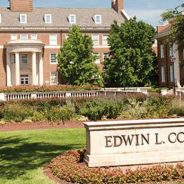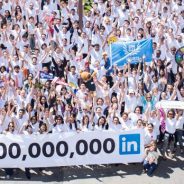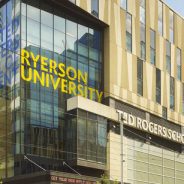Search results for :
Inside Dean Matthew Myers’ Plans for the SMU Cox School of Business
On August 1, 2017, Matthew Myers became the ninth dean of the Southern Methodist University Cox School of Business. As the former dean of Miami University’s Farmer School of Business in Oxford, Ohio, Dean Myers comes to Cox with plans to build on the school’s current strengths and enhancing its offerings.
In a Cox Today article titled “The Dawn of a New Dean,” SMU Cox dives into Myers’ plans in a detailed interview. Here’s what he had to say.
Joining Cox
According to Myers, the most frequent question that he’s asked is, “Why Cox?” He explained that he was looking for an institution that knew its place in higher education and had an established identity. It was also important to love the city where the school was located, and he and his family were immediately drawn to Dallas.
“Dallas has a robust economy with people willing to invest in Cox and SMU,” he said. “You cannot have a world-class city unless there is a world-class university, and a world-class university cannot exist without a world-class business school.”
Investing in Teaching and Research
For Myers, there are many assets to the Cox School, and one of the greatest is its faculty and staff, in whom he plans to invest heavily to enhance the school’s research reputation.
“If you look at the top 30 business schools, the common denominator is excellence in research reputation. Teaching and researching complement each other—rather than detract from each other, as some believe.”
In particular, Myers will focus on improving research in the areas of global marketing and strategy issues, especially since crossing organizational boundaries has been a major theme in Myers’ career.
Investing Globally
Myers also hopes to bring his penchant for global business to SMU Cox. “We do not have a choice in business education but to be globally oriented, not just geographically,” he said. “The practical and relationship side of global business, including neighboring countries such as Mexico, should be a focal point.”
Myers even talked about how the NAFTA issue is salient for Cox both in terms of its research and topics of discussion in the classroom. This type of contemporary commentary about global issues is what he wants to bring to SMU Cox.
Investing in Students
Myers is also interested in enhancing the use of technology and innovation in the curriculum for each of the school’s degree programs. “That’s where the growth sectors are in the global economy,” he explained. “Cox graduates should have a place in those sectors after graduation no matter what their major is. It’s certainly something to focus on in the next five to 10 years.”
Dean Myers also plans to increase student exposure to the local and global business markets to better prepare them for the job market post-graduation. “Students have numerous choices in universities, and it’s very competitive,” he wrote. “The strategic relationships we have with the business community are important, as well as being attuned to growth opportunities. Many students want the option to work in entrepreneurial or nonprofit businesses, or they may want to work in London or Seoul with global firms.” SMU Cox will aim to provide opportunities that fit each student’s wants and needs.”
Investing in Partnerships
This limited development time also motivates Dean Myers to enhance SMU Cox’s partnerships with corporations and initiatives in the Dallas area. He explained that he’s interested in Dallas’ potential particularly for start-up incubators, venture capital, and entrepreneurship. “I want to understand how we can be involved,” he said.
Myers already feels that the Cox and Dallas communities are energetic, but he wants to enhance the strong academic relationships even further to leverage opportunities for students. For example, he noted that many top recruiting firms are cutting back to just a handful of university relationships, and he wants to ensure that SMU Cox stays in the mix.
“We want to make sure we are inside that play with all of the major companies, such as American Airlines and GE, and with startups, too,” he said. “We think we are there already, but it’s competitive and we have to modernize.”
About Dean Myers
Myers began his career in academia in 1997 after earning his Ph.D. in marketing and international business from Michigan State University. He became a professor at the University of Tennessee, where he led the Marketing and Supply Chain Management Department at the Haslam College of Business from 2008 to 2010. From 2010 to 2013, he served as the associate dean of executive education at Haslam. During that time, he was recognized three times as “the outstanding faculty member for MBA programs” and was responsible for launching the global Executive MBA program, which partners with ESSEC Business School in Paris and Central European University in Budapest.
In 2014, Myers became dean of Miami University’s business school. Of his appointment, he said, “The extension to the dean role was very fluid and natural. Giving the external nature of work and its greater connection to business, it was an area in which I could contribute.”
This article has been edited and republished with permissions from our sister site, Clear Admit.
Executive MBA Metro NY
Cornell Executive MBA Metro NY Program Structure
The Executive MBA Metro NY program is a 22-month, executive-style program offered on alternating weekends in New York City.
Curriculum and Experience
The Cornell Executive MBA Metro NY program features a comprehensive, integrated, general management approach that is designed for experienced professionals from a variety of industries. Students are introduced to a holistic view of business operations that emphasize the refinement of leadership and advancement of management skills.
The program, which is organized in four terms—each beginning with a week-long residential session at Cornell University (Ithaca, NY)—emphasizes core coursework in its first year, with advanced and strategic coursework incorporated into the curriculum in its second year. Students complete a total of six electives throughout the program, which are offered during the winter residential sessions and vary from year-to-year based upon student preferences.
The Metro NY program includes a Saturday overnight stay on class weekends, which creates an immersive format for extended networking, focus and collaboration, and engagement with classmates and faculty.
Class Profile
The Cornell Executive MBA Metro NY class features 70-75 students who are an average of 36-years old with an average 12 years or relevant work experience. Approximately 34 percent of the class comprises women students.
Careers
The Cornell Executive MBA Career Development team partners with each executive MBA student to develop a customized and strategically-designed professional development path that is focused on individualized objectives and needs. Once developed, a dedicated EMBA career coach will provide resources, tools, and programming to support these goals.
Tuition, Scholarships, and Financial Aid
Tuition for the Cornell Executive MBA Metro NY program Class of 2021 is $195,498 (USD). A limited number of partial merit-based scholarships are available for applicants.
There is no need-based aid available for Johnson’s graduate/professional students. There are federal student loans available to U.S. citizens and U.S. permanent residents (green card is required).
The Cornell Executive MBA Metro NY program is a proud member of the Yellow Ribbon Program. Formal submission of the Yellow Ribbon application and Certification of Eligibility (COE) are required for consideration.
Admissions
Applications are reviewed on a rolling basis. In advance of formal application submission, applicants are encouraged to complete a pre-assessment to see if they are a possible fit for the program.
As part of your formal application, applicants must provide:
● Resume
● Organizational chart
● Two required essays
● Official transcripts from all undergraduate and graduate schools attended
● Two letters of recommendation; one of the letters should be from an immediate supervisor
● $200 (USD) application fee
Application deadlines are as follows:
November 15, 2021: Priority Consideration
January 5, 2022: Priority Consideration
March 1, 2022: Regular Decision
May 15, 2022: Final Application Deadline
Interviews, granted by invitation only, are conducted shortly following the submission of a complete application. Decisions are typically communicated within two to three weeks of the interview. Classes begin late in July.
Tech MBA
Johnson Cornell Tech MBA Program Description
The Johnson Cornell Tech MBA program prepares students for career success in the digital economy. An MBA designed to transform tech-focused individuals into business leaders and entrepreneurs, this one-year program is where networks, industry, and experiential learning combine.
The Johnson Cornell Tech MBA is defined by hands-on experience with interdisciplinary connections. MBAs work with engineering, law, and computer science students to produce visionary ideas grounded in significant needs.
This MBA program is all about real-world experience in ideation and creation. In addition to completing foundational MBA core courses, students work on cross-functional teams in Studio to develop tech solutions for real company challenges. With the majority of the program based at Cornell Tech in New York City, students are surrounded by a rapidly expanding tech sector and frequently interact with industry leaders, startup founders, and venture capitalists.
Curriculum
The Johnson Cornell Tech MBA curriculum begins during the summer semester at Cornell University’s Ithaca, New York, campus. Students complete foundational core courses in 10 weeks. Topics range from financial accounting to marketing and leadership development.
The remainder of the program, two semesters, is delivered at Cornell Tech on Roosevelt Island in New York City. Students are immersed in the tech industry and have access to state-of-the-art facilities in and around the campus. MBA-specific modules are combined with co-curriculum offerings among other graduate students at Cornell Tech. The program’s hands-on components are executed in Studio: Product Studio, Startup Ideas, and Startup or BigCo Studio, for example. Your interdisciplinary group will take product ideas from conception, through development, and to launch stage while seamlessly integrating business and technology principles. You might also opt to complete intensives in fintech or digital marketing during the spring semester.
Class Profile
Eighty-one students are enrolled in the Johnson Cornell Tech MBA Class of 2023. The students are, on average, 29 years old with 5.5 years of full-time work experience. Thirty-one percent of students are female. Students had an average GMAT of 696 and an average 3.5 GPA.
Career Statistics for the Cornell Tech MBA
Cornell Tech is located among the expanding tech sector in New York City. Its proximity to startups and established companies and organizations gives you ongoing opportunities to connect with industry leaders and hiring managers. To help you learn more about tech careers, Cornell Tech hosts weekly Conversations in Studio, bringing in speakers to talk about their paths and experiences. Throughout the year, and because of the program’s industry-immersive design, you’ll work on developing your networks as you plan for your next career step.
As most Cornell Tech students pursue careers in tech, career management focuses on practicing technical interviews, often conducted by experienced external practitioners. Prospective employers, experienced entrepreneurs, and venture capitalists are invited to campus for tech talks instead of traditional recruiting presentations. On-campus blitz interviewing events are held twice a year, and use an internally-developed algorithm to match employers and students.
The median base salary for the Class of 2021 was $150,000 with an average sign-on bonus of $50,000. As most graduates accepted jobs with tech companies, a significant portion of the annual compensation is represented by equity, the value of which compresses salary relative to offers with no equity component.
Tuition, Scholarships, Financial Aid
Current tuition for the Johnson Cornell Tech MBA program is $118,758. To help students finance their studies, Cornell Tech offers scholarship aid to a limited number of master’s degree students each year. All scholarships are merit-based and are determined by review of an applicant’s credentials at the time of admission. All admitted students who are not fully sponsored are considered. There are also a variety of loan options available to Johnson students, including federal loan programs for U.S. citizens and private loans for international students.
Admissions to the Cornell Tech MBA
Applicants to the Johnson Cornell Tech MBA program must submit an online application, resume indicating all post-bachelor degree employment, a personal statement, one letter of recommendation, GMAT or GRE scores, official academic records or transcripts, and $200 for the application. International applicants must also submit TOEFL or IELTS scores, if necessary.
2022-2023 Cornell Johnson Tech MBA Deadlines
Round 1: October 11, 2022
Round 2: January 5, 2023
Round 3: March 7, 2023 (Final Deadline)
FAQ
Is the Cornell Tech MBA STEM certified?
Yes, the Cornell Tech MBA is STEM certified and prepares students for career success in the digital economy.
Is Cornell Tech the same as Cornell University?
Yes, Cornell Tech is a campus of Cornell University. The Johnson Cornell Tech MBA is a part of the Cornell SC Johnson College of Business at Cornell University. Students begin their curriculum during the summer semester at Cornell University’s Ithaca, New York, campus and complete their core courses in 10 weeks at Cornell’s main campus in Ithaca, NY.
What is the Cornell Tech MBA Ranking?
The Cornell Tech MBA is a part of the Samuel Curtis Johnson School of Management, which according to major publication rankings is typically ranked in the top-20 globally.
Two-Year MBA
Johnson Graduate School of Management Two-Year MBA
The Two-Year, full-time MBA program at the Johnson Graduate School of Management at Cornell University is defined by its tight-knit community, one-of-a-kind curriculum, and dual-campus approach. Students are prepared to hit the ground running and stand out among their colleagues—first during their internship and then again as they begin their new career.
Johnson’s full-time Two-Year MBA program features one-of-a-kind curriculum, with fully integrated leadership development components and the opportunity to take advantage of programming offered in partnership with Cornell Tech in New York City.
The first semester of the program is centered around core courses, while the second semester allows students to pursue a particular course of study through an immersion. Students complete a summer internship and complete their remaining year of the program with electives and an optional area of focus.
Curriculum
Johnson’s faculty and lecturers employ a variety of teaching methods, such as case studies, lectures, group projects, team building and leadership activities, and industry treks. MBA classes at Johnson typically begin in late August and end in mid-May, and Commencement occurs shortly thereafter. Johnson works on a semester system, with full-time students completing coursework during the fall and spring terms, and nearly all students go on to complete a summer internship at the end of their first year. Throughout the academic year, Johnson students have short breaks each semester for holidays such as Thanksgiving, with a longer break in between semesters.
Beginning during Orientation and extending throughout the first semester, all first-year students participate in the required Johnson Leading Teams Practicum course. In this course, which is designed to help students develop their leadership skills, MBA entrants work together in small teams of five to six students on problem-solving challenges and core course group projects.
Within the first year of study, Johnson students must complete nine core classes, taking seven in the fall term and completing the remaining two in the spring. The core covers foundational business principles in accounting, marketing, management, operations, strategy, and finance. First-year students must also complete an immersion learning experience in the spring semester by choosing from eight available offerings. Each immersion learning experience includes elective courses, site visits, and case studies that prepare students for post-MBA careers in fields such as strategic marketing, investment banking, and sustainable global enterprise.
In the second year of the MBA program, students can shape their studies by choosing from the school’s more than 80 elective course offerings. Students may further tailor their education to their career interests by pursuing an area of focus from a list of 12 options. Johnson also allows students to take courses at other Cornell University schools and apply them to the MBA degree. Finally, students looking for international exposure can spend a semester studying abroad at one of Johnson’s 30 exchange partner institutions.
Class Profile
The Johnson Two-Year MBA Class of 2024 enrolled 303 students. Students in the class of 2024 had a median GMAT score of 710 and a median GPA of 3.30. The incoming class also had a mean of five and a half years of work experience. Thirty-nine percent of the first year students were women, while 16 percent were underrepresented minorities, which refers to students of African American, Native American, and Hispanic American backgrounds. Domestic students accounted for 57 percent of the class, with the remaining portion of students coming from outside of the United States.
Career Statistics
About 93 percent of Johnson’s Two-Year MBA Class 2020 received job offers. The average starting base salary for Johnson graduates was $138,767, while the mean signing bonus accepted by recently minted Johnson MBAs was $36,391. Thirty-four percent of the Class of 2020 accepted finance positions, including 22 percent pursuing roles in investment banking. Consulting was the second-most popular function and was chosen by 30 percent of the class. Meanwhile, 21 percent of 2020 Johnson MBA graduates moved into management and about 9 percent opted for marketing.
Tuition, Scholarships, and Financial Aid
The tuition for the Johnson full-time MBA is $76,690 per year. However, the school estimates that with additional expenses such as rent and textbooks, students will pay up to $107,622 in that time. To help students finance their studies, Johnson offers a range of merit-based scholarships. Admitted students are automatically considered for certain merit-based awards, and about 30 percent of Johnson students receive related financial support. The most prestigious of scholarships offered to incoming students is the Park Leadership Fellowship, which provides a full-tuition grant for up to 25 entrants who apply for this fellowship.
Johnson is part of The Consortium for Graduate Study in Management, an organization devoted to promoting diversity in business schools. MBA candidates may apply to Johnson through The Consortium, and they are then eligible for full-tuition fellowships. For those applicants who did not receive awards during their first year, there is one scholarship opportunity open to returning students: the Fried Fellowship. There are also a variety of loan options available to Johnson students, including federal loan programs for U.S. citizens and private loans for international students.
Admissions for the Cornell Johnson Two-Year MBA
Applicants can elect to apply to Johnson during one of four admissions rounds, which usually occur in October, November, January, and March. Johnson requires applicants to submit their completed online application along with essays, a resume, GMAT or GRE scores, and transcripts from all collegiate and post-collegiate institutions attended. Applicants must also submit one letter of recommendation and an optional second letter. For applicants whose first language is not English are required to submit TOEFL or IELTS score. All applicants must pay a $200 non-refundable application fee. After applications are evaluated, the admissions committee conducts interviews on an invitation-only basis. Interviews may take place on campus with a current second-year MBA student or member of the admissions committee, while those applicants who cannot travel to Ithaca can complete an interview via Skype.
Application Checklist:
• Completed online application form
• Resume
• List of activities
• Goals Statement and one required essay (a second essay is optional)
• Academic records and transcripts for all post-secondary coursework and degrees*
• GMAT or GRE score report (test waiver optional)*
• TOEFL or IELTS score report (for applicants whose first language is not English)*
• One letter of professional recommendation (a second letter is optional)
• Non-refundable $200 USD application fee
*You may submit unofficial copies of your transcripts and test scores for your application; however, if you are admitted and enroll, you will be required to submit official copies of these documents by the required deadline. Offers of admission are not binding until we verify your official academic records and test scores.
2022-2023 Cornell Johnson Two-Year MBA Deadlines
Round 1: September 22, 2022
Round 2: January 10, 2023
Round 3: April 11, 2023
Get an MBA Admissions Edge with the LiveWire Data Dashboard
Curious about your chances of gaining admission to top business schools? Now you can see how hundreds of previous applicants fared at SC Johnson in just a few clicks. The LiveWire Data Dashboard’s interactive data visualization tools allow you to spot trends, compare MBA programs, and benchmark your stats against successful applicants at your target schools. Learn more here! Ready to explore the data? Purchase a 30-Day or 365-Day subscription in our shop for immediate access!
McDonough Professor Douglas McCabe Honored With New Award
Georgetown Professor Douglas McCabe of the McDonough School of Business was recently honored with the “Best Paper Award” at the 2017 Annual Conference of the American Society for Competitiveness in Washington DC. This year’s conference theme was “Breaking Down Barriers to Competitiveness: A Path Forward.”
McCabe’s paper was titled “Conflict Resolution and Organizational Justice in the Workplace—The Evidence Based Research” and discussed current evidence-based research on how employees can achieve justice, equity, and voice within organizations.
“Conflict and its resolution play a critical role in organizations,” McCabe said. “A growing proportion of companies and corporations have turned to various dispute resolution procedures to resolve the complaints and grievances of their employees within the organizational behavior context.”
McCabe’s work has already become more than just research, having been put into practice at progressive firms. “Many of these quality and legitimate systems were put into place based upon the policy recommendations of my stream of research, as well as the research of other human resource management scholars,” he said.
This was the fourth Best Paper Award McCabe has earned during his career at Georgetown’s McDonough School of Business. The professor of management has worked at McDonough since 2013, teaching EMBA and management classes. Additional awards earned by McCabe include:
- Recipient of the Award for the Best Conceptual Research Paper at the Fourteenth Annual Conference of the American Society for Competitiveness
- Recipient of the Best Paper Award at the Fourth Annual World Business Congress of the International Management Development Association
- Recipient of the Best Professor Award of the inaugural class of the Executive Master’s in Leadership/District of Columbia Public School Principals at the McDonough School of Business
- Recipient of the Excellence in Education Award of the Labor and Employment Relations Association
- Twice Recipient of the Joseph F. LeMoine Award for Undergraduate and Graduate Teaching Excellence of the McDonough School of Business
- Twice the Recipient of the Outstanding Reviewer Award from the Emerald Literarti Network of the Emerald Group Publishing Limited. Additionally
- Recipient of the Certificate of Recognition from the National Office of The Phi Beta Kappa Society
McCabe earned his Ph.D. from Cornell University, his M.S. from Loyola University of Chicago, and his B.A. magna cum laude (Phi Beta Kappa) from Marquette University. Along with his written work in numerous academic refereed journal articles, papers, monographs, and speeches, he is also an active domestic and international management consultant.
Why More and More MBAs are Coming to LinkedIn: #LinkedInLife
Since its 2003 launch, LinkedIn has been shaping the way people find jobs, becoming the most extensive professional social network on the planet. With over 530 million users, it is clear how the platform could pair job seekers with a multitude of career prospects. LinkedIn was just voted Company of the Year by HRDive for the comprehensive recruitment resources it offers its users. However, a network this expansive presents its own pool of opportunities. In fact, Glassdoor dubbed LinkedIn one of the 25 best places to work in 2017. For a company that prides itself on such a unique work environment, its employees even have their own hashtag (#linkedinlife). The company’s rising importance as a recruiting tool in the global economy (hence, over 30 offices worldwide) and its award-winning work environment make a career at LinkedIn an excellent option for MBA grads.
#LinkedInlife
LinkedIn takes a values-centered approach to building its employee culture. According to the company’s website, the values that define LinkedIn are: integrity, humor, transformation, collaboration, and results. Employees are entitled to a multitude of benefits, including 401(k) and Roth contributions, paid parental leave, 17 paid holidays, and an employee stock purchase plan (ESPP). The company also demonstrates its commitment to inclusive strategies by providing back-up childcare resources for employees whose children have special needs.
The Human Rights Campaign designated LinkedIn as one of the best places to work for LGBT equality in 2017. LinkedIn makes an effort to provide resources for its community’s LGBT members, including (but far from limited to) supporting gender reassignment surgery and ensuring that domestic partners and same sex spouses are included in U.S. Benefit programs.
In addition to a unique and inclusive set of standards and values, LinkedIn provides an environment that is far more exciting than that of the standard corporate job. According to The Undercover Recruiter, each floor of LinkedIn’s London office is structured according to a theme. The sports-themed floor has a Wimbledon Room with astroturf on the walls and an umpire chair.
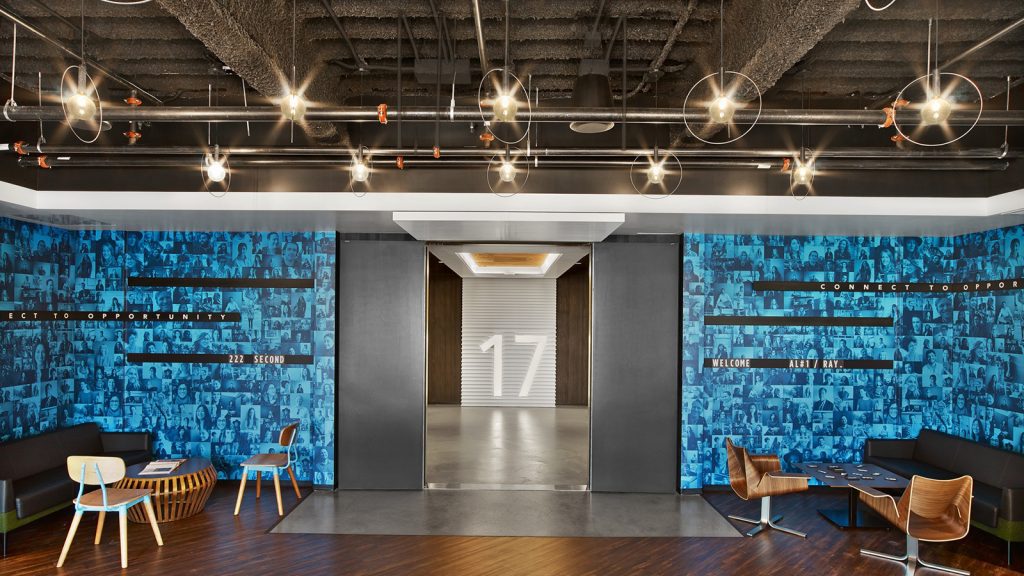
Inside LinkedIn’s San Francisco headquarters/Photo by Eric Laignel.
Getting Hired
In recent years, LinkedIn has trended toward using its website and platform, as well as hosting regional events for recruiting as opposed to using traditional job fair settings. MBAs at LinkedIn can find jobs in sales, marketing, finance, product, and business development through the Student Careers program. At LinkedIn, the community is organized into teams, and each team has its area of focus. Professionals seeking careers specifically in business can choose from about fifteen possible teams. The Corporate Development and Strategy team, for example, leads the way in determining company strategy and analyzing market activity and opportunities. The Global Solutions team focuses on marketing, hiring, and sales. Those who wish to focus exclusively on marketing can look into the LinkedIn Marketing Solutions (LMS) team.
In a 2015 interview with Cosmopolitan, LinkedIn Global Talent Acquisitions Leader Tey Scott discussed how, despite its headquarters being located in Mountainview, CA, the company hires talent from everywhere—which can mean a lot for both domestic and international MBAs.
“We hire from around the world, and we have an amazing relocation assistance program that supports all levels of hires,” she says. “We offer temporary housing, and help employees find daycare, schools, or other things that suit their needs—whether it’s a student relocating from [the East Coast] to Silicon Valley, or someone who has to relocate an entire family and sell a house.”
Scott continues, saying, “We also try to help people get to know the new area they’re moving to. For recent graduates and students, we’ll put them in a LinkedIn group and start conversations with them so they can figure out what neighborhoods they want to live in, and even help them find roommates.”
The company has also made an active effort to convert interns into full-time employees, she adds. “The goal is to convert as many people who come through it into full-time employees. We have interns in all of our locations globally, and we even host interns from other Bay Area tech companies for an annual intern hack day at our headquarters. Undergraduate and MBA interns must be enrolled full-time in a program and return to the program following the internship.”
Find out more about LinkedIn’s MBA internship opportunities here.
MBAs Profit As Paid Consultants through TCU Neeley & Associates
At the Texas Christian University Neeley School of Business’ Neeley & Associates, MBAs have the chance to gain more than just hands-on business experience as paid consultants for major companies.
The Neeley & Associates are a group of MBA student consultants who can earn both business experience and a paycheck by offering insights and strategies for major companies facing business challenges. The students act as principle consultants, but are are provided with ample resources and guidance in the form faculty, staff, and professional consultants.
The program benefits both students looking to gain experience and the companies, who are able to find affordable and innovative solutions to their challenges. Past clients have ranged from PepsiCo. to Nike to GM Financial, and all of the consulting is paid work.
Many students have since been hired or offered internships at the companies for which they served as consultants. Others simply found that the consulting experience on their resume gave them a competitive edge on the job market. “Few candidates have ever done a consulting project. It gave me examples of how I creatively overcame a difficult challenge for a major company,” Greg Goolsby said of his Neeley & Associates experience. Graduating with his MBA in 2008, Goolsby currently serves as the senior licensing and acquisition manager at FUNimation.
Ed Riefenstahl, Director of Experiential Learning at Neeley, also commented on the many benefits the program has for students. “In addition to applying new knowledge from the classroom, Neeley & Associates MBAs get to experience and develop skills that are applicable and beneficial to the rest of their careers.”
Bloomberg Ranks Ted Rogers MBA Among World’s Best
Just a few weeks after Bloomberg Businessweek debuted its list of the top U.S. MBA programs for 2017, the publication revealed its ranking for the best international schools, with the Ted Rogers School of Management at Ryerson University being lauded as not only one of the best schools in Canada, but one of the best in the world.
The Bloomberg Businessweek ranking looks at factors such as the success rates of alumni in starting careers, starting wages, and surveys from recruiters, current students, and graduates of the program.
This marked the first time the Bloomberg Businessweek ranking has featured the Ted Rogers MBA, but the program’s success has not gone unnoticed, especially in Canada. The school is also regarded as one of the 100 best MBA programs in the world by The Economist and by the Canadian Business’ Top 10 Canadian MBA programs four years in a row. The program also placed in the top ten this year among the Bloomberg‘s ranking of top salaries and job placement for recent graduates.
Since its creation in 2006, the Ted Rogers MBA has been highly regarded for its innovative approach to business education and location at the center of Toronto’s business district. “From the beginning the Ted Rogers MBA benefitted from strong leadership, a commitment to excellence, and a focus on students’ careers,” Ted Rogers MBA Director Kim Bates said in a press release following the release of the annual ranking.
“As a startup program, we were able to configure our programs to reflect the new century and differentiate from our established competitors,” she adds. “Our career results are excellent, program delivery and commitment of faculty and staff are exceptional, and we have had support from our academic leadership to admit only high-quality students.”
French business school INSEAD led the way in this year’s ranking, taking over for the London Business School (LBS), which swapped the number one and two spots from last year. Ted Rogers, 24th overall, was one of five Canadian business schools to land on the list, with the Ivey Business School at Western University Canada earning the highest ranking among the group—11th overall.
Check out the entire 2017 Bloomberg Businessweek international MBA ranking here.
Just How Much Are Stanford MBA Grads Getting Paid?
Wondering what kind of pay day you can expect if you are among the select 6 percent of applicants who gain admission to Stanford Graduate School of Business (GSB)? Are you sitting down? Perhaps you should be, because the school’s 2017 employment report—released today—reveals record-breaking salaries for the third year in a row.
On average, last year’s graduates, now in their first year of post-MBA work, are pulling down an annual base salary of $144,455—a $4,000 increase over last year’s all-time high (median base compensation was $140,000, also besting last year’s by about $4,000). But it doesn’t stop there. Average signing bonuses, reported by 51 percent of the class, are also up—setting a new record at $29,534. (Median salary bonuses remained unchanged at $25,000.) And as if that weren’t enough, another quarter of the class reported other guaranteed compensation (OGC) surpassing last year’s all-time highs by a whopping $10,000. Average OGC for 2017 grads was $83,065, and median OCG was $50,000. The range was $6,750 to $450,000.
The GSB, in announcing these most recent employment statistics, pointed out that OGC will no longer be tracked by the MBA Career Services and Employer Alliance (CSEA) and that it began last year capturing an “Expected Performance Bonus” metric in its place. This measure includes both guaranteed and non-guaranteed cash compensation based on performance. Though the average and median EPB for the Class of 2017, at $71,946 and $35,000, were each lower than OGC figures, a full 65 percent of the class expected to receive such performance-based compensation, up from 61 percent last year—and substantially higher than the quarter of grads who reported OGC. The reported range for EPB was $5,000 to $450,000.
Stanford MBAs claim higher pay days than graduates of any other school, in part thanks to higher base compensation. Stanford’s median base—$140,000—surpassed that of Harvard Business School (HBS) ($135,000), the University of Pennsylvania’s Wharton School ($130,000), and the University of Chicago Booth School of Business ($125,000). Grads from both Stanford and HBS reported the same median starting bonus of $25,000, but the $50,000 in other guaranteed compensation reported by Stanford grads was double what grads at the school’s top East Coast rival reported.
Tech Less of a Draw Than in Prior Years
Bucking the trend at many other business schools—where increasing percentages of students are clamoring to enter the technology industry—fewer Stanford MBA Class of 2017 grads headed into tech. In what the school deemed “a rebalancing of the scales among the three top industries,” interest in technology dropped 8 percentage points—to a mere 25 percent of the class. Almost a third of the class—32 percent—headed into finance, up a point over last year. Consulting, too, gained four percentage points to attract 20 percent of the most recent class.
“Our leading employers span a wide variety of industries,” Maeve Richard, assistant dean and director of the Career Management Center, said as part of a news story announcing the latest employment statistics on the Stanford GSB site. “They represent organizations in such areas as consulting, finance, technology, consumer products, healthcare, and nonprofits. What they do have in common is work environments that offer the ability to make an impact with a focus on agency, career development, diverse challenges, and responsibilities.”
Indeed, a record-setting 411 organizations hired Stanford MBA students and graduates for internships or full-time roles this past year—up 7 percent over last year and 34 percent from six years ago. A whopping 95 percent of employers hired just one or two students—an indication of the breadth both of GSB employers and student interest.
Uptick in Women Headed into Private Equity and Venture Capital
“In addition, we observed that the number of women going to private equity and venture capital has nearly doubled since 2014,” Richard said as part of the Stanford GSB article. “While we do not disclose fine-grain gender detail and the numbers are still small, we see a definite widening of the cracks in the glass ceiling.”
It’s no wonder that Stanford GSB women would increasingly be looking to break into PE and VC, since those fields yield some of the very highest pay days. The highest reported base salary for the Class of 2017—$285,000—went to a graduate headed into venture capital. Median base salaries for both PE and VC were $175,000, $40,000 higher than for the class as a whole. And it was a graduate headed into a private equity analyst role who reported the mind-boggling $450,000 in other guaranteed compensation. The median signing bonus for PE—at $50,000—was also the highest in the class (on par with investment banking). Though it was a graduate headed into a marketing role who claimed the highest signing bonus of the class, $77,000.
Timing and Location of Offers
Stanford GSB reports full-time offer and acceptance rates at graduation and three months out from graduation—as mandated by CSEA standards. But in past years—as this year—the school has made a point of underscoring the fact that its graduates’ confidence in their ability to find the perfect job sometimes means they hold out longer in accepting their ultimate position than graduates from some other schools. That said, 92 percent of the Class of 2017 had offers three months out from graduation—up two points over last year—and 88 percent had accepted offers, a five-point increase year over year.
In terms of where geographically the most recent Stanford MBA grads wound up, the West was the winner—with 62 percent of grads choosing to remain in the region. This represents a 3 percent decline compared to last year. “Counter to assumptions, only 35 percent of these West region jobs relate to technology,” the school notes. “Finance represented 26 percent, and consulting represented 15 percent.” The Northeastern United States drew the second-most Stanford grads, 16 percent of the class. Another 11 percent took international jobs.
Also of note, 16 percent of the class launched their own startups upon graduation, up one percentage point over last year. Leading industries for these entrepreneurial students include software (15 percent), finance (11 percent), healthcare (9 percent), real estate (9 percent), and internet services (9 percent).
More Grads Seek Socially Responsible Roles
Another notable shift in these most recent employment statistics is the increasing number of Stanford MBA grads heading into careers in socially responsible roles or organizations. Thirteen percent of this year’s graduates answered yes to the question, “Have you chosen a socially responsible role in a private business?” That’s up from just 8 percent last year, when the question was first introduced.
Watch this space for an upcoming piece that will highlight several Stanford students who chose internships focused on social impact this past summer—a Clear Admit exclusive.
This article has been edited and republished with permissions from our sister site, Clear Admit.
Showdown: Find Out if You Should Get an MBA in New York City or Los Angeles
The battle for hip-hop supremacy may have ended in the ’90s, but we can keep the East Coast-West Coast beef alive while looking at full-time MBA programs in New York City and Los Angeles.
Both cities are home to top business schools and are ripe with employment opportunities in booming industries. But which is best for you? Let’s take a deeper dive.
Location
We’ll start with location, location, location.
The most bustling city in the country, NYC is is the capital of the business world. More Fortune 500 companies are headquartered here than in any other city. The city is not only home to Wall Street and the world’s largest financial institutions, but also some of the largest media, marketing, and advertising companies. While New York City can be daunting in its size, it’s also furiously expensive to live in, so it may not be for everyone. Getting to know the city’s vast public transportation system is a must and it can get pretty cold in the winter, so if you’re looking for beaches, keep reading.
Meanwhile, LA is Tinseltown. The city’s economy is driven by entertainment industries like television, film, video games, music recording, and production, but also by international trade, technology, petroleum, fashion, apparel, finance, telecommunications, and tourism. In the 2017 Global Financial Centres Index, Los Angeles was ranked as having the 19th most competitive financial center in the world, and sixth most competitive in United States. The city is also the largest manufacturing center in the western United States, with the ports of Los Angeles and Long Beach comprising the fifth-busiest port in the world and a vital trade route within the Pacific Rim.
New York City Full-Time MBA Programs
Full-time MBA Programs in New York City include:
- Stern School of Business – New York University
- Gabelli School of Business – Fordham University
- Columbia Business School
- Zicklin School of Business – Baruch College
What stands out about these programs?
A Columbia MBA opens up countless career options and is sure to pay off in the long run: The average starting salaries for Columbia MBAs is $104,000, with 37 percent of full-time MBA of graduates being employed in the financial services industry.
Meanwhile, Stern’s MBA curriculum gives students tons of flexibility, and allows degree seekers to choose one or two MBA specializations, NYU allows up to three specializations from 20 plus options.
Both Gabelli and Zicklin’s full-time programs feature cohort-based structures. Gabelli’s program features a New York immersion experience where, over the course of five days, students are exposed to a number of company visits with corporations like Deutsche Bank, Money.net, and Hewlett Packard. As an alternative to completing a major, Zicklin students may pursue a joint JD/MBA in conjunction with Brooklyn Law School or New York Law School.
Los Angeles Full-Time MBA Programs
Full-time MBA Programs in Los Angeles include:
- Anderson School of Management – UCLA
- Argyros School of Business – Chapman University
- Graziadio School of Business and Management – Pepperdine University
- Marshall School of Business – USC
- Peter F. Drucker and Masatoshi Ito Graduate School of Management – Claremont Graduate University
What’s special about these MBA programs?
Anderson features a Business Creation Option for MBAs, which gives students the chance to start their own businesses while still in school. Meanwhile, the Special Project Option challenges groups to tackle problematic issues that impact an entire industry.
Chapman’s full-time MBA curriculum features three main components—core/required courses, a capstone course, and elective courses. Students have several track options available to concentrate their studies, including: Corporate Finance, Marketing, Investment Management, Entrepreneurship, Information Systems in Digital Times, and more.
Graziadio full-time MBA students have the option to spend a trimester abroad in the fall term of their second year at one of Pepperdine’s partner universities in Africa, Asia, Europe, Latin America, or Oceania.
USC MBAs have required study-away coursework called PRIME International Experiential Learning, a 10-day site visit overseas. Students must complete industry—and company-oriented recommendations in capstone projects that incorporate concepts from global strategy and global economics.
At the Drucker School, students may choose two areas of concentration to focus their studies, and select elective within these areas of concentration. Concentrations are offered in: Strategy, Finance, Marketing, Leadership, Global Management, and Information Technology Management.
Jobs and Salary
When it comes to job placement, both New York and Los Angeles have their perks.
New York is home to business school with the highest job placement rate: Around 97 percent of Columbia Business School graduates receive offers within three months of graduation. The school’s class of 2016 boasted an average starting salary of roughly $125,000 plus a $25,000 signing bonus. The top three industries that employ Columbia graduates are financial Services (37 percent), consulting (35 percent) and technology/media (10 percent).
Check out a complete breakdown of NYC salaries and employment opportunities, give our guide to getting paid in New York a read.
While Silicon Valley has a reputation for being the prime place for MBA jobs in California, LA has been catching up recently—and fast. Los Angeles has embraced the tech boom in a big way, with many Valley bigwigs and new startups alike moving their operations to Silicon Beach. With that in mind, the new era of LA innovation is creating some lofty starting salaries, particularly for MBA graduates.
Recent UCLA Anderson graduates earned an average starting salary of $121,250 with a $25,000 signing bonus, according to statistics released by the school. The top five industries to employ Anderson MBAs are in tech (30.6 percent), financial services (21.6 percent), consumer products (13.4 percent), and consulting services (13.4 percent).
Check out our guide to the highest MBA salaries in Los Angeles for more information.
Alumni Spotlight: Daryl Morey and Swapping Intuition for Analytics
In 2006, when Houston Rockets owner Les Alexander announced that MIT Sloan School of Management MBA, analytics expert, and relative NBA unknown Daryl Morey would eventually serve as general manager of the team, the basketball community was surprised, to say the least. A Hoopsworld headline, at the time, read, “Daryl Morey? Are You Serious?”
Though using quantifiable data to make business and strategic decisions across the majority of professional sports has become the norm, in 2006, it was far from standard practice, especially in the world of basketball. At the time, Michael Lewis’s book, Moneyball, was just three years old, and it only highlighted the use of analytics in baseball; perhaps the most straightforward team sport to quantify.
Now, 11 years into his career as a general manager, Morey’s use of analytics to guide NBA decisions ranging from draft picks, to whether a player should go for a three-point shot or a mid-range jumper (hint: take the three point shot) has made him a sports statistics pioneer.
Early Life and Career
While growing up in Medina, Ohio, Morey developed a love of sports. But, according to a profile in Slate, after reading articles written by alleged authorities making predictions for sports teams’ successes that proved way off base, Morey began to question the effectiveness of these experts. Shortly after this realization, Morey happened upon a book by the original sports statistics advocate, Bill James, author of the seminal 1977 book The Bill James Baseball Abstract. James’s data-based philosophy immediately resonated with Morey as the way to mold winning sports teams.
Though he knew early on that he wanted to devote his life to sports, Morey was uncertain of how to gain access to the exclusive business side of the industry. During his time at Northwestern University, Morey sent scads of letters to pro teams, begging for a shot at even the most low-ranking jobs. Each of these letters went unanswered. “So I decided at that point that I had to be rich. If I was rich I could just buy a team and run it,” Morey said.
It was this line of thinking that led the young midwesterner to apply to MIT’s Sloan School of Management. After earning his MBA from MIT in 2000, Morey pursued a career in consulting. Eventually this led to a job working for the Boston Celtics. It was during this time that Morey began applying a statistical model he had developed to size up amateur players to the actual draft. Just a couple of years later, Morey was approached about a managing position for the Houston Rockets, where he has now served as general manager for eleven seasons and has just signed on for an additional four years.
Philosophy and Contributions
At just 21-years old, Morey adapted Bill James’s Pythagorean Expectation, a formula used to predict how many games a team would win, to basketball. “I would have never guessed that you could adapt the Pythagorean to basketball,” James said.
In basketball, Morey is partially credited with normalizing the use of analytics in player acquisitions, as well as approach to the actual game. Under his leadership, the Rockets acquired franchise cornerstone James Harden in what is, in hindsight, already considered one of the more lopsided trades in basketball history. Morey was also instrumental in starting the annual MIT Sloan Sports Analytics Conference, a forum wherein students and professionals can exchange views on the role of analytics in the sports industry.
When asked about his thought processes in Northwestern Magazine, Morey said, “You don’t fool yourself, you take a lot of chances, you cut your losses quickly. That’s all you can do.”
Like the slow-crawl of acceptance sabermetrics toiled through in Major League Baseball, Morey’s analytical imprint on the NBA has routinely drawn the ire of some of the game’s most notable figures, including Hall of Famer, “golfer,” and Inside The NBA host Charles Barkley. In 2015, Barkley routinely chided `the Rockets’ paltry defensive efforts, noting Morey’s tactics of bringing in players seemed fairly basic.
Just two years later, however, and the Rockets are currently riding a 10-game win streak and sit atop of the vaunted Western Conference, with Harden earning potential MVP praise and point guard Chris Paul commanding one of the league’s best offenses. And Morey’s analytical emphasis on three point shooting and pick and roll sets, dubbed “Moreyball,” has never been more prominent. The Rockets lead the league—by far—in three-point attempts per contest, launching a blistering 43.2 per game. For context, the team with the second most three-point attempts per game, the Brooklyn Nets, take 33.8 per game—nearly 22 percent less than Houston.

Stats via NBA.com/Washington Post
The Rockets’ analytical trend may seem extreme, but the rest of the league is still taking notice. The average three point attempts taken per game, nearly a quarter of the way into the 2017-18 season, is the highest ever at 28.7 attempts per game per team; and those figures have gone up every year since 2012. If Moreyball remains a staple of the NBA offense, expect that figure to be broken again in 2019.
Other Pursuits
Morey has a love of musicals, and even proposed to his now-wife Ellen before a production of Grease. It makes sense then that the man the New York Times called a “wizard in the field of quantitative analysis,” has chosen to devote his time to producing a musical. The show, “Small Ball,” is slated to debut in 2018.
How Chicago Business Schools are Helping Low-Income Students
Business school doesn’t come cheap, which often means that prospective students who could benefit the most from the lucrative career opportunities that come with an MBA either don’t end up at top tier programs or don’t end up applying at all.
The flip side is that MBA programs now more than ever desperately need more diverse perspectives in their classrooms—yet it seems the same ol’ folks end up in these slots every year. Many in academia are woefully ill equipped to meet the challenges of a more diverse and inclusive business landscape but there are a handful of MBA programs that have begun to catch up and take strides to make business educations more accessible to qualified low-income applicants.
The Chicago metro just so happens to be packed to the gills with high-ranking MBAs that take initiative to help promising candidates. Let’s take a deeper dive into four of our favorite Chicago MBA programs that have historically lent a hand to low-income students.
Northwestern’s Kellogg School of Management
Situated just above the city limits on Chicago’s North Shore (see: John Hughes movies), the Kellogg School of Management is among the nation’s most coveted MBA programs—and among the most generous too. Kellogg offers a variety of different scholarships based on merit or financial need for newly admitted students and rising second-year students, as well as external scholarship resources through the Office of Fellowships for Graduate Students.
YOU MAY ALSO LIKE: Tech Grads Surge in New Northwestern Kellogg Employment Report
Director of Admissions Melissa Rapp explains that Kellogg understands that funding a business school education can be challenging. “To help students meet this challenge, a variety of merit scholarships are offered, including diversity scholarships, such as James P. Gorter Scholarship which is awarded to under-represented backgrounds in the Two-Year MBA or MMM program, and academic, professional or special interest scholarships, such as the Health Enterprise Management Scholarship which is awarded to an outstanding student interested in pursuing a career in healthcare.”
UIC’s Liautaud Graduate School of Business
UIC Business provides opportunities to empower graduate students with a dynamic, proven, business education, and an immersive city experience that enhances both quality of life and career opportunities. Many UIC Business students have financial need and the school makes a point to acknowledge its dedicated staff of advisors who help every student navigate the financial aid process. Alanna O’Connor, Assistant Dean for Student Recruitment and Sid Balachandran, Program Director, explains:
“As a state institution we strive to maintain costs for students and are committed to providing a world-class business education at a campus nationally recognized for its diversity. We offer our competitive programming at a more affordable value than some of our peer schools. The affordability of our program is an important part of providing a high return on investment. Multiple tuition waivers, scholarships, assistantships—teaching or research—are also are available for students who qualify.”
Notre Dame’s Mendoza College of Business
The Mendoza College of Business walks the walk when it comes to a socially engaged, community-centered vision of business. Part of that mission entails actively courting and supporting stellar applicants who might demonstrate need, particularly women through the Forte fellows program.
“As a sponsor school for the Forte Foundation, Notre Dame is committed to launching women into successful business careers. Forte Fellows are recognized for their academic aptitude, leadership, and future potential,” the school notes. “Forte Fellows are granted special access to the Forte community, including leadership conference access, mentoring and career development opportunities, and network development.”
It also means that students with deep interests in corporate social responsibility might do well to apply to Mendoza. According to Mendoza, it awards more than 65 percent of one-year MBA students merit-based fellowships based on “academic performance, prior work experience, GMAT or GRE scores, leadership potential, letters of recommendation, and each applicant’s personal statement.”
Lake Forest Graduate School of Management
In its commitment to “attract and develop outstanding leaders who change lives,” Lake Forest has a number of MBA-centric fellowships and scholarships:
- The President’s Scholarship supports “proven leaders who have achieved measurable results, demonstrate a high level of self-awareness and adaptability, and are committed to developing their leadership potential.”
- The Emerging Leaders scholarship supports students who “demonstrate exceptional leadership potential and show the ability and desire to deliver meaningful results, think innovatively, and gain a heightened level of self-awareness.”
- The $3,510-7,000 Leadership Scholarship supports students who demonstrate financial need and “strong leadership potential, verbal and written communications skills, intellectual ability, and motivation.”
- The Yomine Scholarship supports students “are employed in a manufacturing position” who demonstrate financial need
- The $3,510 Tuition Assistance Grant supports “candidates who are not eligible to receive tuition assistance from their employer.”
- The Gariano Scholarship supports “women with an undergraduate nursing degree” who demonstrate financial need.
Loyola’s Quinlan School of Business
The Loyola Quinlan School of Business offers two merit-based scholarships to MBA students: the Dean’s Merit Scholarship, which typically covers 1-2 courses, awards “stellar academic performance” and the $1,000-10,000 Graduate Business Student Scholarship, which supports students “who have proven academic success and demonstrated financial need.”
Why Bloomberg Businessweek Is Praising the UGA Terry College of Business
At the top of last month’s annual Bloomberg Businesweek domestic MBA rankings, the normative favorites reigned supreme, with the likes of the Harvard Business School, the Wharton School at the University of Pennsylvania, and the MIT Sloan School of Management sitting at the top of the ranking. A quick glance at the top 20 features more of the same, with Ivy League institutions coming in strong, as well as other large school powerhouses like the UCLA Anderson School of Management.
But the real meat and potatoes of the list, beyond stacking trophy cases for the already trophy-rich schools at the top, are the schools that shoot up the rankings the most, sometimes jumping eight or more spots from the previous year. Among the most lauded institutions that made its way up the rankings is the University of Georgia Terry College of Business, climbing from 65th overall in 2016 to 55th overall this year.
Santanu Chatterjee—the full-time MBA Director and Associate Professor of Economics at the Terry College of Business—recently spoke with MetroMBA, saying that part of the reason the school has earned such high praise is because of the concentrated effort of life after graduation.
The school has “a purposeful and deliberate strategy that connects admissions, student experience, and career management, by focusing on employability at the front end, a high level of customized career services for both students and employers, and a market-driven curriculum that ensures professional success for our students,” according to Chatterjee, who originally joined the Terry College of Business in 2001, just after earning his Ph.D. in economics from the University of Washington.

Santanu Chatterjee, Terry College of Business Director, Full-Time MBA Program and Associate Professor.
Although the Terry College of Business is part of the University of Georgia, one of the largest state schools in the U.S., its reputation still lags a bit behind some of the other big name brand institutions. As evident in its climb in the Bloomberg Businessweek ranking, however, its reputation as one of the better, under-the-radar business schools may be soon changing as the result of a plan that has been years in the making.
“Over the past three years, we have focused on making our curriculum more sensitive to the needs of the marketplace,” he says. “Initiatives have included new concentrations in Healthcare Management and Human Resource Management, areas of emphasis in Consulting and Financial Technology (FinTech), and an expanded focus on experiential/project-based learning. Most of our students complete one project with a corporate partner before their summer internships. We have also revamped our Leadership Fellows Program, and set up two new advisory boards, in Atlanta and in the Silicon Valley.”
Part of the wave of program changes over the past few years also comes from newfound partnerships with many of the University of Georgia’s other esteemed colleges, establishing newfound dual degree programs to help facilitate an academic edge many of the country’s smaller schools simply cannot provide.
“While we continue to work on making the MBA curriculum more market-driven, we are also focused on a more interdisciplinary approach to business education,” he says. “Over the past three years, we have worked to develop new dual degree programs with the College of Engineering, Law School, Medical School, and the College of Public Health. New dual programs are currently being developed that include the College of Pharmacy and a one-year STEM MBA for UGA undergraduates in the STEM disciplines. A new one-year Master of Science program in Business Analytics is also awaiting final approval from the University System. These new programs will enable us to significantly expand our corporate relationships and partners, which in turn will help support our curriculum and student support initiatives.”
The use of broader university resources speaks to what Chatterjee believes is becoming a definitive advantage to not only Terry College of Business students, but University of Georgia students as a whole.
“Across the board, the Terry College of Business is focused on student success by providing them with an outstanding academic and experiential learning experience,” he notes. “This philosophy cuts across programs at all levels, from undergraduate to the Masters and Ph.D. [programs]. We have a roster of world-class faculty, excellent facilities, and a dedicated network of more than 70,000 alumni who work tirelessly to improve the quality of education and career success for our students.”
Even with the noted praise Chatterjee eschews for the business school, one program strength he may be overlooking is the welcomed affordability of the Terry full-time MBA, which only costs Georgia-based residents $15,670 per year, compared to several of the more popular MBA programs in the U.S., which often venture into triple digit territory by the end of the program.
For more information on the Terry College of Business and its increasingly praised MBA program, head over to the official Terry College of Business website.
Made in Italy and NYU Stern: James & Salvatore Ferragamo
When it comes to Italian high-fashion, names like Gucci, Versace, and Prada often come to mind. These companies, known for their quality products and timeless brands, are staples in both the fashion and business communities. Salvatore Ferragamo S.p.A., another Italian fashion company, is notable for not only their quality leather and fine wine, but also for their leadership, namely twin brothers and NYU Stern School of Business MBA graduates James and Salvatore Ferragamo.
All in the Family
James and Salvatore followed the footsteps of their father and company CEO Ferruccio, and grandfather Salvatore, who founded the brand in 1928. The company’s current structure features each of the founder’s six sons and daughters with a role on the board of directors, with other relatives also taking jobs within the organization.
However, the Ferragamo clan decided that only three members from the family’s third generation should be involved in the family business. These three members were required to have a university degree, an MBA, three years of working experience outside of Ferragamo, and English and IT skills. James and Salvatore accepted this challenge: Both graduated from NYU’s Stern School of Business with a BS in 1993 and again with an MBA in 1997.
What have the two Ferragamo heirs and Stern MBA alumni been up to lately? Both have been utilizing their strengths to push the Ferragamo brand to new heights in different ways.
Expanding “Made in Italy”
James is currently the Director of Women’s and Men’s Shoes and Leather Goods for the Salvatore Ferragamo Group. His responsibilities include overseeing all categories from bags to belts, with a focus on shoes. He briefly worked at Goldman Sachs before completing his MBA in 1997 and joining the family business. James was the first member of the third-generation Ferragamo’s to enter the business.
According to James, a big part of innovation is collaboration. Since 2010, all leather goods collections have been created side by side with the brand’s creative director, Massimiliano Giornetti. Together, James and Massimiliano have pushed Ferragamo into modern territory, while still respecting the brand’s heritage.
YOU MAY ALSO LIKE: Supply Chain Management MBAs: The Best New York Programs
“Together, we need to communicate Ferragamo’s creativity,” James told the South China Morning Post. “For Massimiliano, he pushes on the accelerator of creativity and creates novelty with the ready-to-wear. My role is to try and make sure that we have quality and never compromise on it.”
Ferragamo has always prided itself on being “Made in Italy” and James says that will remain the brand’s headlining message, even as it expands into new markets like China. “No matter what, all our products will always be made in Italy,” he said, doubling down on his decision to keep all production inside of Italy in the near future. “My father had a very rigid point of view on this. Italy, to us, represents a certain uniqueness, and people love this idea of artisanship.”
Resurrecting Il Borro
Instead of following the career trajectory of the rest of his family, Salvatore followed his true passion: wine.
“[My brother James] likes fashion, and I like wine, so it worked out perfectly,” Salvatore told The Drinks Business.
Since graduating from Stern’s MBA program in 1997, Salvatore has been tasked with expanding Ferragamo’s brand portfolio into wine and agro-tourism at Il Borro villa. The Ferragamo family purchased the Tuscan vineyard in 1993 and Salvatore has led efforts to restore the estate and innovate the wine production business, while always sticking to the family’s commitment to being “Made in Italy.”
“Fashion and wine are both a question of lifestyle, personal taste, and sensibility,” Salvatore told Wine Enthusiast. “When I was growing up, I was surrounded by a spirit of fine craftsmanship and careful attention to details that are the hallmarks of ‘Made in Italy.’ My family has always believed that this approach is the best way to express creativity, tradition and quality, and it’s true in both fashion and wine. For example, all of the grapes that go into our wines are carefully chosen by passionate hands that give each bottle its own character.”
In September, Salvatore revealed that Il Borro is producing an amphorae wine made with Sangiovese with the skins kept in contact with the clay vessel for one year. The clay is sourced locally and is made by a local amphorae maker. The wine “Unlike French oak, amphorae doesn’t give the wine notes of tobacco or spices, it focuses more on the fruit notes of the wine,” he said. Salvatore added that he is also experimenting with “a secret project” — a Chardonnay made with the same method.
Reflecting on NYU Stern
In 2006, James and Salvatore invited a group of Stern alumni to their flagship Fifth Avenue store. At the event, the Ferragamo twins were asked how studying at NYU Stern and working in New York helped them as they entered the business world.
“NYU helped me to balance my professional experience with my academic experience,” James said. “Living and working in New York City provided the opportunity to understand the practical application of what I learned, as both a graduate and an undergraduate, whether it was about finance, fashion, marketing, or advertising.”
“Studying in New York gives you the unique opportunity to learn in the business capital of the world and to be in contact with people from different countries, cultures, and businesses,” Salvatore said. “This is very important as I am promoting Il Borro estate worldwide, and it is crucial to understand, recognize, and respect different cultures when entering into any type of global business relationship.”
Fashion and Future at Stern
Recently, alongside the new Tech MBA, the Stern School of Business introduced the forward-thinking Fashion & Luxury MBA, which features several high-profile figures on its advisory board from the likes of Dolce & Gabanna, Tiffany & Co., Nike, Vogue and more.
For more information on the NYU Fashion & Luxury MBA, click here.
NYU Stern Receives $8 Million Alumni Gift to Promote Technology, Business, and Innovation
This week, NYU Stern School of Business announced the development of a new center to serve as a hub for cross-disciplinary collaboration and technology innovation. The new Fubon Center for Technology, Business, and Innovation was made possible thanks to an $8 million donation from alumnus Richard Ming-Hsing Tsai (MBA ’81). Tsai is chairman and CEO of Fubon Financial Holding Co., Ltd. and Fubon Life Insurance Co., Ltd. He is also vice chairman of Taiwan Mobile Co., Ltd.
The Fubon Center will support and facilitate collaboration in areas such as fintech, business analytics, technology, and entrepreneurship. It will also serve as a new nexus for continuous innovation at NYU Stern by strengthening industry ties and promoting cutting-edge research. Additionally, the Fubon Center will help to shape future coursework and encourage academic collaboration between NYU Stern and National Taiwan University, Tsai’s undergraduate alma mater.
“Technology demands that companies, regardless of industry, be nimble, adapt, and innovate at an unprecedented rate,” Stern Dean Peter Henry said in a press release.”Thanks to the generosity and inspiration of our alumnus Richard Tsai, we can help transform these challenges into exciting opportunities, staying as relevant to the new economy as we are to Wall Street.”
The new Fubon Center isn’t the only initiative that has been established over the last 18 months at Stern. In 2014, the school delivered one of the first courses on blockchain, which eventually led to the creation of the MBA FinTech specialization in 2016. Then, this past May, Stern launched a new Tech MBA, a one-year specialized MBA program focused on business and technology. It offers experiential learning projects with companies through Stern Solutions Programming. These initiatives and others are all part of Stern’s latest mission to expand its offerings at the intersection of business and technology.
To learn more about what NYU Stern is doing in the technology and business space, visit the school website.
ICYMI–Stern’s advances in technology education and career placement were also featured in this recent Clear Admit story: “More Top Business Schools Training MBA Students for Careers in Tech.”
This article has been edited, updated, and republished on our sister site, Clear Admit.
Facebook Tops Glassdoor’s 100 Best Places to Work List
Employer review website Glassdoor, which allows users to read anonymous employee testimonials about employers, has revealed its annual “Best Places to Work” list, with familiar MBA recruiters Facebook, Bain & Co, and Boston Consulting Group (BCG) earning the top three spots.
Why Facebook?
Since 2011, the social media empire has been one of Glassdoor’s most praised companies to work for, earning a top five spot seven out of the past eight years, including three number one overall awards. Facebook employees are often given extensive benefits, including four months of paid maternity leave—a policy often considered a luxury in the U.S., which has no legally mandated paternity leave policies for employers. As well, earlier this year, Facebook COO Sheryl Sandberg announced the company would implement paid sick time for employees and family members.
With increasing revenue streams, the company’s hiring numbers have continued to swell, with nearly 19,000 employees as of earlier this year—a 38 percent jump from March 2016 to March 2017. In fact, just this week, the company announced it will be adding 800 more jobs at its new London office.
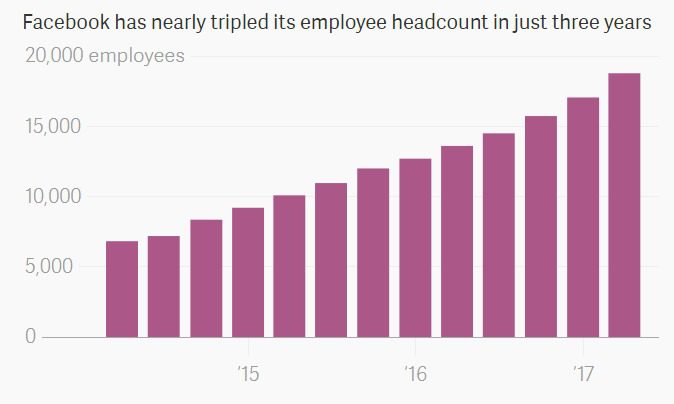
Data via Facebook, graphic by The Atlas/via Quartz.
Of course, the central pitch to work at the social media monolith may be predicated on the payment of employees. According to Paysa, the average Facebook salary is north of $250,000 annually, combining base pay, bonuses, and equity. Most jobs at the company start at, at least, $70,000 USD annually, with business management roles starting at $135,000.
The company has also made a concerted effort at diversifying its hiring. Speaking with Forbes, Lori Goler, vice president of people, said, “Diversity is critical to our mission at Facebook, because we serve a community of 2 billion around the world, and of course there’s diversity in that community.”
The company, according to Forbes, employs between 33 and 35 percent women, and there has been considerable gains among women employed with computer science and engineering backgrounds, as well as a 500 percent increase in employment among those of African descent since 2014. In the interview, Goler added, “We’re nowhere near where we want to be, but we’re at least hearted to see that at least we can make some progress.”
Check out Facebook’s graduate student recruitment page here.
Consulting Companies Still Reign
While certain statistics indicate a wave of MBA grads may be leaving consulting in favor of tech-centric employers, as evident by the recently released Northwestern University Kellogg School of Management employment report, consulting companies are remain one of the primary targets for MBA students and graduates, and for good reason.
Bain & Co., like Facebook, has been endlessly praised by Glassdoor reviews, ranking among the top four best places to work every year since 2009. Like most of the companies on the year-end list, Bain offers ample benefits, including several months of paid maternity leave, comprehensive vacation and insurance policies, and one of the world’s best 401K offers. Fellow Boston metro company BCG also officers a considerable parental leave benefits package, retirement planning, and lofty salaries.

Inside the New York City BCG office/Photo via BCG.
Like Bain, BCG makes a concerted effort to bring in incredibly comparable MBA graduates, recruiting students from multiple prominent business schools like The Wharton School, NYU Stern, Columbia Business School, and many more.
Some Traditional Companies Remain Steady, While Giants Like Apple Stumble
Tech empire Google, not surprisingly, held its place among the top 10 companies—having never fallen lower than eighth overall since 2012. Just outside of the top ranking companies, McKinsey & Co. stayed within the top 20, while other notable heavyweights like Microsoft (39th), Capital One (69th), Deloitte (77th), Accenture (83rd), and Apple (84th), the world’s most successful consumer company, fell to the lower ends of the list.
Despite having the second most profitable year in company history, falling shortly behind it’s 2015 figures, Apple has been steadily dropping down Glassdoor’s annual Best Of list, posting its worst standing in the history of the ranking—nearly 50 spots worse than last year’s ranking of 36th overall.
Considering, however, that the annual ranking is comprises of over 500,000 companies, this drop may not be as serious as it would appear. The overall Glassdoor rating for Apple was 4.3, in contrast to Facebook, which boasts a current 4.6 rating. The average Glassdoor rating for employers, for context, is 3.3.
Some Surprises
Not every company included in the Glassdoor Best Of list could be considered a traditional MBA recruiters, including beloved U.S. west coast fast food chain In-N-Out Burger (fourth overall), growing athletic leisurewear empire Lululemon (sixth), wine company E. & J. Gallo Winery(14th), Delta Airlines (17th), and The Church of Jesus Christ of Latter-day Saints (19th), which provides “Excellent dental and medical coverage,” according to an anonymous employee. Plus, “you work with people who don’t swear.”
For a more extensive overview of the methodology behind the ranking, click here.
Gain a Global Edge with These Philadelphia International Business MBAs
Every day, it becomes easier and easier to make connections across the world, building a global network of business and resources that can help to benefit the world. Due to an increasingly global economy, possessing a deep knowledge and understanding of the way global markets work can be a crucial part of building a business career. There is almost no limit to the types of opportunities an education in global business will provide: from working in the fields of international trade, global business operations or planning or industrial development, and being employed by international agencies, non-profit organizations, governmental, or both public and private corporations.
According to Michigan State program globalEDGE, “demand continues to grow for individuals who understand the global context of business: from the logistics of international trade and cross-border investments to the cultural and ethical issues that are imbued in the practice of business around the world. By studying international business, you will learn about world cultures and societies, and be challenged to approach issues from different perspectives.”
In choosing to study international business in the Philadelphia metro area, aspiring business leaders can center themselves in a growing market at the center of United States history and global trade. We’ve rounded up some of the area’s top MBA programs that offer a concentration in international business, allowing students to gain specific knowledge and skills to make an impact in the global economy.
Fox School of Business – Temple University
Consistently rated one of the top business schools in the country, the Fox School of Business at Temple University offers students a number of opportunities to gain skills and earn a degree in the field of global business. The Global MBA program, based in Philadelphia, is taught by world renowned faculty and is designed to provide an experiential education in international economics, with live consulting, internship and professional development opportunities. Additional programs like the MBA from Temple University Japan in Tokyo and the EMBA at Temple University Paris offer further opportunities for students to gain a hands-on global experience with a strong business background.
Lerner College – University of Delaware
The MBA at University of Delaware’s Lerner College of Business gives students the opportunity to concentrate in international business, providing the solid business background they will need to effectively conduct business in a global environment. In addition to U.S. citizens looking to expand their knowledge in international business and help their organizations to expand overseas, many students in the Lerner MBA program are international, returning home with a deep understanding of U.S. customs and the ability to navigate business across borders.
YOU MAY ALSO LIKE – Searching for the World’s Top MBA Recruiters: Comcast
Rutgers School of Business, Camden
Students interested in concentrating in International Business and Operations can do so at the Rutgers School of Business by pursuing a number of electives in the field. Students can take a number of electives in the fields of International Business and Operations Management to complete the concentration, including courses like: International Management, Global Operations Information Technology, Global Marketing Strategy, and International Study Abroad in countries such as South Africa, France, and Brazil.
Smeal College of Business – Penn State
While the Smeal College of Business at Penn State does not directly offer a concentration or major in international business, it is an available as an option. At Smeal, options constitute a briefer but still targeted study within a particular area, allowing students to gain a deeper education in Global Business while still receiving the more general education of an MBA.
The Wharton School – University of Pennsylvania
The Wharton School at UPenn, well-known as one of the top business schools in the world, provides students the opportunity to pursue a joint MBA/MA in International Studies. The MBA/MA Lauder Joint-Degree provides students a range of resources and educational experiences in global business, such as the Global Knowledge Lab, which involves students working together as a team to produce a thorough research paper/master’s thesis. The program also includes two short global immersions and an optional ten-day trek called Culture Quest, organized completely by students in the program. The six areas of concentration students may choose to specialize in include: Africa, East and Southeast Asia, Europe, Latin America, South Asia, the Middle East, and North Africa.
3 Washington DC Nonprofit MBA Programs You Need To Know
It’s fair to say that the finance and consulting industries are the most popular for business school grads. But what about non-profits and social enterprises—where do they rank? While some assume that an MBA and working for a nonprofit do not go hand-in-hand, that’s not the case.
According to Fast Company, the nonprofit sector is the third-largest segment of the U.S. workforce, employing more than 13.7 million people at 1.8 million organizations, accounting for 10 percent of the country’s total workforce. The sector is the seventh-largest economy in the world—with combined assets of nearly $3 trillion, the U.S. nonprofit sector is larger than the economies of Brazil and Russia, and its neighbor to the north is taking notice. According to Nonprofit HR, in 2015, 50 percent of nonprofits were hiring compared to just 34 percent of for-profits. Nonprofit wages have also increased by 29 percent between 2000-10 and continue to rise, and exciting jobs in the sector are perfect for MBAs.
Some schools run entire centers and initiatives dedicated to the idea of social change. Other schools offer social entrepreneurship coursework, concentrations and graduate certificates with their MBA program. Here’s our rundown of three nonprofit MBAs in the Washington DC metro.
George Washington University School of Business
Students enrolled in the GWSB MBA program may combine their advanced business degree with a graduate-level certificate. One certificate program offered by the school is the Graduate Certificate in Nonprofit Management. This program is intended for students hoping to advance their careers in the nonprofit sector, as well as students who want to expand their knowledge but who do not want to commit to a master’s degree program.
The certificate requires that students complete 12 credit hours and maintain at least a 3.0 grade point average in order to be awarded the Graduate Certificate. Sample coursework includes:
- PPPA 6031 – Governing and Managing Nonprofit Organizations
- PPPA 6032 – Managing Fund Raising and Philanthropy
- PPPA 6016 – Public and Nonprofit Program Evaluation
- PPPA 6033 – Nonprofit Enterprise
- PPPA 6034 – Managing Nonprofit Boards
- PPPA 6053 – Financial Management for Public, Nonprofit, and Health Organizations
- PPPA 6058 – International Development NGO Management
The Graduate Certificate in Nonprofit Management program is available at the George Washington University’s main campus in downtown Washington DC.. Certificate students enroll in regular courses of the Trachtenberg School and earn graduate credit. Regular graduate tuition and fees apply.
Kogod School of Business – American University
The Kogod School of Business at American University also offers a Graduate Certificate in Nonprofit Management. According to the school, the certificate provides those currently working in the nonprofit sector a program combining both academic rigor and skill set training to enhance their performance in this growing work sector, as well as a foundation for master’s degree students about to enter the field.
The certificate program requires 18 credit hours of approved coursework with at least 9 credit hours at or above the 600-level and encompasses course offerings from the School of Public Affairs, the Kogod School of Business, and the School of Communication, as well as select coursework from the School of International Service and the College of Arts and Sciences.
Sample coursework includes:
- ACCT-607 – Financial Accounting
- FIN-630 – Financial Analysis of the Firm: Concepts and Applications
- COMM-642 – Strategic Communication Management
- MGMT-609 – Management of Organizations and Human Capital
- MGMT-633 – Leading People and Organizations
- PUAD-681 – Managing Nonprofit Organizations
University of Maryland R.H. Smith School of Business
The UMD Smith Dingman Center of Entrepreneurship and Center for Social Value Creation offer several different venues and opportunities for students to explore social entrepreneurship. According to the school, the Center for Social Value Creation was founded in 2009 and aims to educate, engage and empower Smith students to employ business principles that help not just the bottom line, but also the world. You can learn more about the UMD Smith Center for Social Value Creation here.
Students can pitch business ideas with a social mission through the Center’s Pitch Dingman program, or receive support and resources for their own social enterprises. The Center for Social Value Creation offers graduate coursework in social entrepreneurship at both the undergraduate and graduate levels, and leads Social Innovation Fellows, a one-year program that gives Smith School undergraduate students hands-on opportunities to seek innovative solutions for social and environmental challenges through the application of business principles.
To learn more about using your MBA for a nonprofit career, take a look at our “Should MBAs Work in the Nonprofit Sector” post. Check out our list of the top 10 nonprofit MBA programs in the country for even more options and information.

